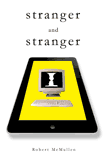ďAny mathematician who got involved with Fermatís Last Theorem risked wasting their career, and yet whoever could make the crucial breakthrough would go down in history as having solved the worldís most difficult problem.Ē
Simon Singh Ė Fermatís Last Theorem
When [stranger and stranger] was first published, I did not want to reveal my diagnosis. More than 10 years after I began writing about my correspondence with Ruth, I have changed my mind.
I have been diagnosed with ME (Myalgic Encephalomyelitis) since 1992. I do not say that I have ME because you donít know what that means, and nor do I. It means different things to different people. People with the same diagnosis have a range of symptoms and experiences. Nobody knows if these people have the same illness or different illnesses. It is not just that nobody knows what has caused my illness or how to treat it effectively, nobody knows what is going wrong pathologically. That I have been diagnosed as having ME by a neurologist and an immunologist, as well as several other consultants and doctors, is an indisputable fact. What is also indisputable is that there are a great number of people like me who have been given the same diagnosis, are suffering a great deal with a variety of immunological and neurological symptoms and are not getting better. Our lives have been destroyed. We are frightened, angry and frustrated. We have been let down by the medical establishment, abused and ridiculed. We are desperate to know what is wrong with us and we are desperate to get better.
Iím sure that other people feel differently but, for me, being given an arbitrary label of equivocal meaning is of very little comfort or value. If it is ever understood what is wrong with me, I wonít be diagnosed with ME anymore. When that time comes, all the people who are diagnosed with ME and have the same illness will be re-diagnosed with a new, more precise label. But there will very probably remain a number of other people whose illnesses are not yet positively identified who will have to put up with being diagnosed with ME or whatever new acronym the medics invent to mean ďthis person is unwell and meets a minimum criteria of ill-defined symptoms but we donít know what is wrong with them.Ē
If you are familiar with the history of public discourse on ME, and have understood and absorbed the intended meaning of my writing, my reasons for originally not wanting to reveal my diagnosis should be fairly straightforward to infer. I wanted to write a book about my experience and I did not want the truth of that experience to become embroiled in the controversy that surrounds the diagnosis.
So why have I changed my mind? The main reason is because I feel a responsibility to show solidarity with other people with the same diagnosis. In order for progress to be made, people need to understand and be aware of the experiences of people like me. However difficult it may be, however vulnerable we may feel, we must be prepared to put our heads above the parapet, assert what we know to be true and unite in demanding what is most needed: money for biomedical research that will lead to scientific understanding, objective diagnostic testing and effective treatments.
When my illness started in 1992, John Smith had just been elected leader of the Labour Party after Neil Kinnock had unexpectedly lost the UK general election to John Major. Tony Blair was a little known MP in a party which had yet to reinvent itself as New Labour, while Bill Clinton was a future President of the United States. Princess Diana was not only alive but not yet separated from Prince Charles. Graham Taylor was the manager of an England football team which still included Gary Lineker and Carlton Palmer. Nobody I knew had a mobile phone. There was one payphone in my halls of residence for over a hundred students and, as far as I know, only one student had a computer in his room.
A lot has changed in technology, science, medicine politics and life since then. Computers and the Internet have revolutionised everybodyís lives, stock markets have crashed, recovered and crashed again. Prime ministers and presidents have come and gone. My friends, most of whom were teenage students then, are now proper grownups; mothers and fathers with careers, houses, pensions and a wealth of experiences. My cousin who was not yet conceived is now applying to universities. Science and medical textbooks written in 1992 are now out of date. But very little has changed for me or the medical understanding of my condition, largely because so little time and money has been allocated to biomedical ME research.
When I was first diagnosed with ME I was 19 years old. Privileged to have been born into a loving middle class family in a wealthy, free and democratic country, I was blissfully naÔve and full of enthusiasm for lifeís adventures. Like most people, I didnít have time to be unwell for 19 days, let alone 19 years. If someone could have told me then what lay ahead, not just the loss but the unrelenting physical discomfort and pain, I would not have been able to cope. I would not have wanted to live.
Now approaching 40 and still dependant on my parents for my care, without improvement in my condition the future is too bleak to contemplate.
Thankfully, in recent years some slow scientific progress has been made. There is still no diagnostic test but more is understood about what is going wrong both immunologically and neurologically in some patients with my diagnosis. There are now a number of clear lines of research which need pursuing to their conclusion. An increasing number of scientists and doctors are becoming not only interested but enthusiastic about the prospect of solving one of the great medical mysteries of our time. I feel that the race which has shamed so many in the time it took to start is finally on. The finishing line cannot come soon enough.
Robert McMullen 2011
© Robert McMullen. All rights reserved.
More writing by Robert McMullen which is not included in any editions of stranger and stranger can be found on the miscellanea page.
If would like to order a copy of stranger andstranger, please follow one of the links below. Please note, the afterword is currently only available in the new ebook edition. At least 30% of the purchase price of ebooks boughts from Amazon stores will be donated to charities funding biomedical ME research, including ME Research UK. ME is also known as ME/CFS and CFIDS.

Amazon.co.uk ebook |

Amazon.com ebook |

